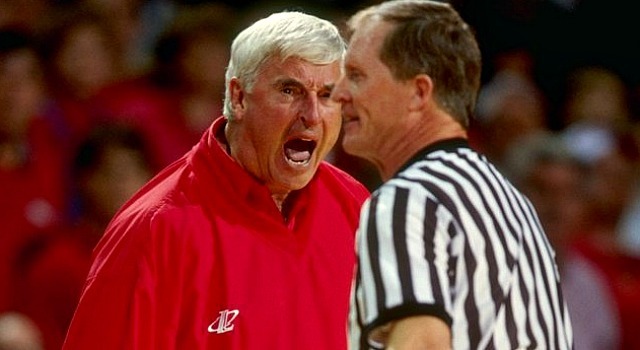(Bobby Knight, left)
In 1984, like a good sports fan, I paid diligent attention–as I had previously in 1976 and 1980–to the Olympics, held that year in Los Angeles. Very few events were telecast live; we had to be content with lengthy packages of highlight clips. Included in them was as the triumphant march to an eventual gold medal of the US basketball team, the last amateur U.S. team to win an Olympic gold medal in men’s basketball. It included, among others, Patrick Ewing, Michael Jordan, Sam Perkins, Chris Mullin and Wayman Tisdale. The team’s coach was Bobby Knight.
| No one else, sometimes I think not even corporate bosses, can control an American body and soul as much a coach. |
From the first time I saw Knight’s Knights play, I was transfixed not just by their dribbling, shooting, and slam-dunking, but also by the sideline antics of their coach. That crimson-faced worthy, seemingly permanently afflicted by a combinatory species of apoplectic fit and asthma attack, raged at all and sundry, pacing up and down like an amphetamine-fueled father in a maternity ward. He did not, then, commit any acts of physical violence—as he would later—but it did not seem it was for lack of intent. To my awestruck eyes, stunned at this sight of an infant’s tantrums embodied in an adult body, it seemed that if he could have, he would have strangled someone, anyone, that had, just for a fatal instant, dared to obstruct his favored methodology of playing basketball. Those nets, ostensibly put up as targets for basketballs, would have functioned just as easily for Bobby as gallows from which he would have strung up those that defied and transgressed his rules.
As you can tell, I was impressed by Bobby Knight; he certainly left an impression. I had never seen a sports coach behave like that. I didn’t realize it then, but I was receiving a quick education in the culture of the American coach, a figure that in this Superbowl week, as is usual, will be deified and exalted by a kind of attention only rarely directed elsewhere at other central figures of American culture.
The peculiar irony of the American coach, of course, as has been obvious to all too many observers of American sports, is that in this land of the Brave and the Free, whose politicians’ speeches are all too often paeans to freedom and the rugged individuality of its citizens, he or she embodies the Grand Vizier of Authoritarianism. No one else, sometimes I think not even corporate bosses, can control an American body and soul as much. Not for nothing did William Gass write in The Tunnel:
I suspect that the first dictator of this country will be called coach.
This thought didn’t cross my mind in 1984 when I watched young giants troop sheepishly off the floor to be berated and harangued by the livid Knight, but some form of it remained front and center as I came to observe more of Knight’s partners in the coaching enterprise. It is a cult that finds sustenance quite easily in its accumulated mythology.
This week, and this coming Sunday, we will witness its latest renewals.
Samir Chopra is a professor of philosophy at Brooklyn College. His most recent book is Brave New Pitch: The Evolution of Modern Cricket. He blogs at samirchopra.com.



0 Comments